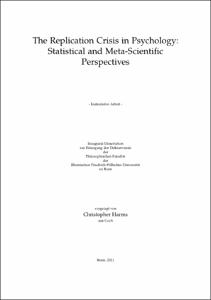Harms, Christopher: The Replication Crisis in Psychology: Statistical and Meta-Scientific Perspectives. - Bonn, 2021. - Dissertation, Rheinische Friedrich-Wilhelms-Universität Bonn.
Online-Ausgabe in bonndoc: https://nbn-resolving.org/urn:nbn:de:hbz:5-64351
Online-Ausgabe in bonndoc: https://nbn-resolving.org/urn:nbn:de:hbz:5-64351
@phdthesis{handle:20.500.11811/9398,
urn: https://nbn-resolving.org/urn:nbn:de:hbz:5-64351,
author = {{Christopher Harms}},
title = {The Replication Crisis in Psychology: Statistical and Meta-Scientific Perspectives},
school = {Rheinische Friedrich-Wilhelms-Universität Bonn},
year = 2021,
month = nov,
note = {Replications are, in the predominant view, an essential part of empirical science. However, the Reproducibility Project: Psychology has shown that systematic replications are rarely carried out in psychological science and many replication attempts fail to replicate prior results. This publication was a major driver for discussions around the "replicability crisis" in psychology. Since at least 2012, the question of replicability, and thus reliability, of studies has preoccupied psychology. In the context of this crisis, various attempts have been made to identify the causes and to improve the reliability of psychological research. In this thesis, the events and points of debate of the last few years are summarised and examined with a special focus on meta-scientific and statistical aspects. In the meta-scientific perspective, the link between theory and statistical hypotheses is particularly relevant in guiding the analysis of empirical data. In the statistical analysis of psychological studies, null-hypothesis significance tests (NHST) are traditionally used in psychology. In contrast, Bayes statistics is explained in this paper and Bayesian parameter estimation and Bayes factors are compared with frequentist significance tests, especially for the case of so-called null effects. Bayes factors can be used to test statistical hypotheses in the context of Bayesian statistics, which is particularly interesting for the comparison of original and replication studies: The "Replication Bayes factors" are introduced for this purpose and derived for multi-group comparisons. Finally, recommendations for conducting replication studies are provided based on a specific replication study and the relevant literature. In particular, the same standards are to be applied as for original studies. The work concludes with an outlook on the further development of psychology as a scientific discipline against the background of the replicability crisis.},
url = {https://hdl.handle.net/20.500.11811/9398}
}
urn: https://nbn-resolving.org/urn:nbn:de:hbz:5-64351,
author = {{Christopher Harms}},
title = {The Replication Crisis in Psychology: Statistical and Meta-Scientific Perspectives},
school = {Rheinische Friedrich-Wilhelms-Universität Bonn},
year = 2021,
month = nov,
note = {Replications are, in the predominant view, an essential part of empirical science. However, the Reproducibility Project: Psychology has shown that systematic replications are rarely carried out in psychological science and many replication attempts fail to replicate prior results. This publication was a major driver for discussions around the "replicability crisis" in psychology. Since at least 2012, the question of replicability, and thus reliability, of studies has preoccupied psychology. In the context of this crisis, various attempts have been made to identify the causes and to improve the reliability of psychological research. In this thesis, the events and points of debate of the last few years are summarised and examined with a special focus on meta-scientific and statistical aspects. In the meta-scientific perspective, the link between theory and statistical hypotheses is particularly relevant in guiding the analysis of empirical data. In the statistical analysis of psychological studies, null-hypothesis significance tests (NHST) are traditionally used in psychology. In contrast, Bayes statistics is explained in this paper and Bayesian parameter estimation and Bayes factors are compared with frequentist significance tests, especially for the case of so-called null effects. Bayes factors can be used to test statistical hypotheses in the context of Bayesian statistics, which is particularly interesting for the comparison of original and replication studies: The "Replication Bayes factors" are introduced for this purpose and derived for multi-group comparisons. Finally, recommendations for conducting replication studies are provided based on a specific replication study and the relevant literature. In particular, the same standards are to be applied as for original studies. The work concludes with an outlook on the further development of psychology as a scientific discipline against the background of the replicability crisis.},
url = {https://hdl.handle.net/20.500.11811/9398}
}






